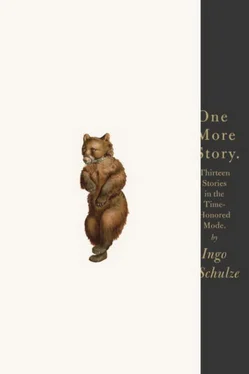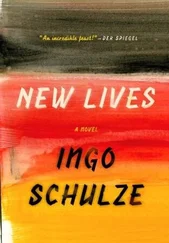Ines smiled and said without opening her eyes, “I see, I see.”
“I just mean,” Pavel said, “that we belonged there, not Jürgen. His Elisabeth wasn’t even the woman in the pavilion. Jürgen took us along one time, but the two of them were already on the verge of crisis. I played for them, on a Thürmer piano, but my mind wasn’t on it, I kept observing myself doing the ‘pianist routine.’ From the third floor you could see not just the meadow with its pavilions, but the big field beyond it as well.”
Pavel removed his shoes by pushing against the heels. I watched the motions his toes made inside his burgundy socks. He made no attempt at all to hide their sweat-stained soles. Boris’s arms were dangling from the arm of the chair like flags in a dead calm. He was snoring softly. Susanne was asleep with one hand at Elvira’s waist, her right arm along the back of the chair, her head thrown back, her mouth slightly open. It had been a long time since I had watched her sleep.
I tried to imagine what lay ahead for Elvira and Boris. I decided I would say something this time — I was going to tell him I’d like to see Elvira again.
I woke up at six on the dot. I was cold, my neck and shoulders ached. Susanne was smiling at me. Elvira and Boris were no longer in the room, I didn’t see Charlotte either. Fred was lying on the rug, Lore beside me on the sofa. Ines was asleep in Pavel’s lap. The window ahead of me had been tipped ajar, the floor lamp turned off, the Venetian blinds opened. A fly was crawling along one slat. Outside, a truck — it was either empty or pulling a trailer — was rumbling along over the cobblestones.
It may sound odd, but when I awoke I had a sense of pride, as if falling asleep in a sitting position with other people around were some sort of accomplishment. I was content, content and happy, as if I’d been given a gift I’d wanted my whole life long.
Susanne had closed her eyes again. I’m fairly certain that I didn’t fall asleep again, and that what comes next was not a dream. I heard a helicopter, and then I spotted it between slats in the blinds. I slid down in my chair until I had the helicopter at the same level as the slat where the fly was crawling. The fly would move ahead just a bit, and then wait as if it needed to regain its strength. The helicopter, however, kept getting closer to it. I didn’t need to make any more adjustments in my position. They collided, and then — I swear — the fly swallowed the helicopter. I waited for it to reemerge behind the fly or below the slat, as the laws of perspective dictated — but it never did. The helicopter had vanished. And only then did I notice that its noise had stopped as well — total silence, only our breathing, even the fly never moved from its spot.
Except for that last clause about the fly, my “little novella”—that was my subtitle — was now written, and I gave it to Susanne to read. If it ever got published, she said, even an impartial reader, who knew nothing more than what I had shared with him, would see through the whole thing from the start. I could spare myself the novelistic conclusion. Reality, she remarked, works very differently than in my stories. I asked her if she thought I might not even need to add anything, if the story might not already have come to its conclusion? If I didn’t have a sense of that, she said, then I didn’t need to torment myself by writing stories, there’d be no point in it, period.
Some say, yes, you’re obligated to invent, it can’t be any good otherwise. But I don’t want to invent things. All that matters to me in this case is to be fair to Boris and that night. The subtitle was wrong, plain and simple. There are no novellas in everyday life. So I crossed out the subtitle, and will continue the way I planned from the start.
Although it was a Thursday, strangely enough no one seemed to be in a hurry. Boris, now in blue-and-white Adidas sweats, set the table and said that actually he hadn’t invited us for breakfast too. When I joined him in the kitchen, he signaled for me to close the door. Leaning against the kitchen window, he asked, “Well, what do you think of her?”
“Wonderful, absolutely wonderful,” I said.
“Except of course that she doesn’t look at all like me.”
“Why should she—”
“It wasn’t what I had in mind, I can tell you,” he interrupted, “for a girl like that to show up and say, ‘Hi, Dad!’ She doesn’t look at all like me. I’ve demanded a blood test. Which has really pissed her mother off, and her, too, of course. But I want the test. How we’ll take it from there is our business, but it needs to be clear-cut, don’t you think?”
Boris went on talking for a while. He also said that if Elvira absolutely didn’t want to live with him, he’d pay for a student pad of her own. The more he thought about it, the better he liked the idea of having a daughter.
I never explained to Boris about my — about our — misunderstanding. Perhaps he had intended it that way. That may well be. I congratulated him on having a daughter.
“We’ll see, we’ll see,” he said. “Awful name. I would never have named her Elvira. But that’s just like her, her mother, just like her!”
After his death Elvira took care of all the formalities. She had a funeral notice printed up and sent to everyone in his address book. There were about fifty people. We immediately recognized Elvira’s mother, Elvira is her spitting image.
I found it a little inadequate that there was nothing except some music. Susanne said I should have spoken, I was his only friend, after all. But in fact we didn’t know each other at all. I could have told them about that evening. But you don’t do that sort of thing extemporaneously, at least I can’t.
Last week we visited Elvira. She’s going to put the apartment up for rent and pay off the mortgage that way. On the dining table was an old dark red tin box. On top of it was a black-and-white photograph. It was of my kindergarten class on monkey bars. Except for two little girls, everyone had risked climbing higher than I had. The next group was waiting in the background. Between my shoulders and the sandals of my friend Lutz Janke, someone had penned in a line with an arrow, pointing to the head of a rather tall boy. I asked if I could have the photograph, a request I realized was presumptuous the moment I made it. But Elvira had evidently expected it and was happy I asked, at any rate she smiled and with no hesitation gave me the photo.
“He wouldn’t even take the train if there were a nonstop flight from Budapest to Berlin on Sundays. That at least is what he said at the end of his interview with Katalin K., a Hungarian journalist, who had offered to help him buy his train ticket for Budapest — for Vienna-Budapest.”
Perhaps a style modeled on a police report would best suit this story, an impersonal tone, sentences without a first-person narrator. The attentive reader would know right off that the real reason for the trip did not necessarily correspond to the reason provided by our traveler (for whom a name is easily found). The phrase, “that at least is what he said”—with emphasis on the verb — would clearly indicate that fact.
It is always tempting to switch from the first-person to the third-person. This third person ends up coming off a little shabbily, and the experience writes itself. But that won’t work in this case, at least when it comes to the crucial turn of events — that is, when our traveler is sitting across from the woman, whose name could be Petra or Katja and whom (during their years together, or better, the years of his alliance with this Petra or Katja) he had called his wife. Or am I mistaken? Might it not possibly be more effective — at that critical juncture — to avoid any sort of commentary and to regard the first-person narrator strictly from the outside (that is, as our traveler) and thus subject him to the same scrutiny to which all other figures are exposed? I don’t know.
Читать дальше












